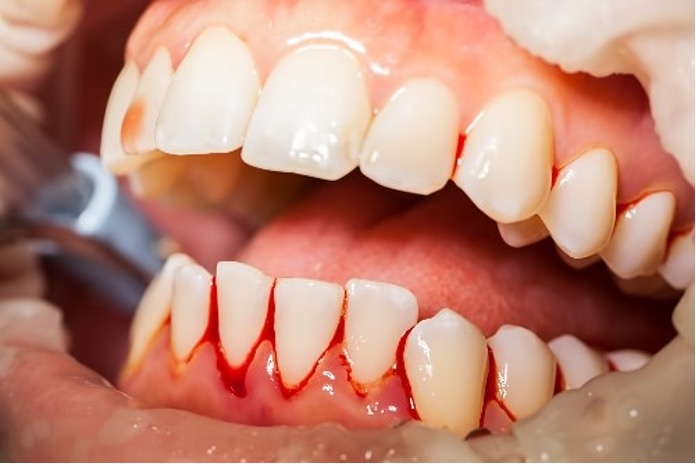Do your gums bleed when you floss or brush your teeth? The most common cause of bleeding gums is gum disease. Almost 70% of adults suffer from some form of gum disease. Bleeding gums may also be caused by something as simple as the wrong brushing technique.
In this issue, we will discuss the common causes of bleeding gums.
- Gingivitis
The main cause of bleeding gums is the buildup of plaque at the gumline. If not removed, this leads to gingivitis, where gums become swollen and tender. If not treated, gingivitis can lead to full blown periodontitis. Periodontitis is one of the main causes of early tooth loss in adults. The good news is that gingivitis is reversible with proper treatment.
- Brushing too hard
Aggressively brushing your teeth does not clean your teeth better. Instead, it can lead to trauma to the gums causing gum recession and bleeding. You should adjust the brushing technique and use a soft- bristled tooth brush. Despite what one may assume, a soft bristled brush is safer to the tissue and just as effective as “hard” or “medium”.
- Wearing poorly fitted dentures
Dentures that do not fit properly can cause gum bleeding if they irritate your gums and cause mouth sores. People who do not take out their dentures at night may be especially proned to bleeding gums. If you wear dentures, it is especially important to take out your dentures then brush and floss your teeth and clean your dentures.
- Pregnancy
Pregnancy gingivitis is a term used to describe a gum condition during pregnancy. About half of pregnant women experience swollen, red, tender gums that bleed during brushing or flossing. This happens because hormonal changes during pregnancy alter the body’s response to bacteria that causes gum disease. Going to your dentist and dental hygienists regularly in conjunction with regular brushing, and daily flossing can help to prevent gum inflammation and bleeding from becoming worse.
- Poor diet
Some ingredients in processed food can irritate the gums and cause them to bleed. Avoid processed and sugary food, and alternatively use a balanced diet full of fruits, vegetables, and food rich in calcium, vitamins A, K and C, and magnesium.
- Health problems
Gum bleeding is more common in patient with certain health problems, such as liver disease, blood clotting disorders, anemia and leukemia. Alcoholics tend to bleed more. Alternatively, smokers tend to bleed less because the nicotine damages the gum’s ability to recognize trauma.
- Blood thinning medications
Prescribed blood thinning medications reduce blood’s ability to clot, which results in easier bleeding. This can be a concern for dental procedures that cause bleeding (e.g. deep cleaning, extractions, and dental implants. You should always tell your dentist if you are taking blood thinning medications at every dental visit.
- Changes in dental hygiene routine
If you have not flossed regularly or brushed properly, your gums might start to bleed when you begin to brush. You should always brush your teeth prior to going to sleep and especially after eating. Returning to good hygiene habits sometimes eliminate bleeding gums. If it doesn’t, then contact your dentist to set-up an appointment because this may be a sign of gingivitis.
A critical concern for bleeding gums associated with gingivitis and periodontitis is the effect of the inflammation on the rest of the body. Locally, gum disease can also cause halitosis (bad breath) and shaky teeth. As far as your overall health is concerned, gum disease can aggravate other chronic diseases one may suffer.
The best prevention or treatment for bleeding gums is to maintain good oral hygiene. This means correct brushing, flossing and regular dental visits.
Bleeding gums are not normal. It’s a note-worthy sign that something is wrong. Maintain good oral health by enjoying good habits thereby promoting good health and wellness.

Severe bleeding gums and gum swelling caused by plaque under the gums

Flossing is the is critically necessary to clean in between the teeth
Dr. Kendal V. O. Major is Founder and CEO of Center for Specialized Dentistry which is a comprehensive family dental practice operating in Nassau and Freeport. He is the first Bahamian Specialist in gum diseases and dental implants since 1989. He also is a certified Fast braces provider. His practice is located at 89 Collins Avenue, Nassau at (242)325-5165 or [email protected]





